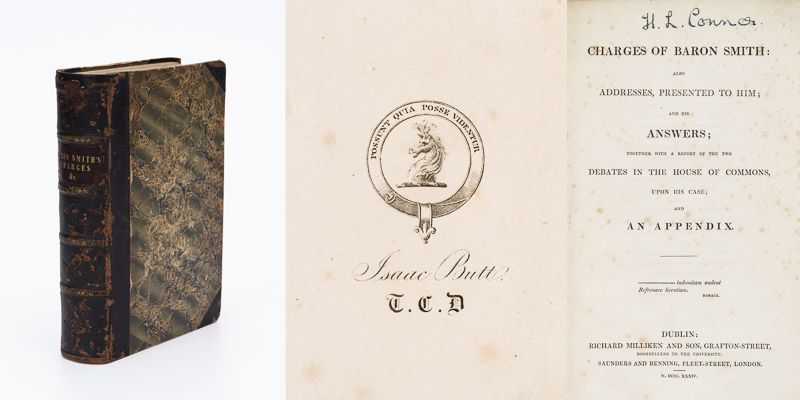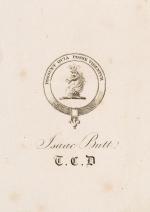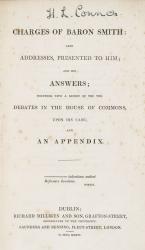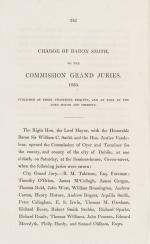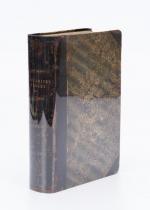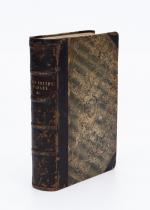[O'Connell, Sir Isaac Butt's personal copy of the famous report of the Select Co
Sir Isaac Butt’s personal copy [with Trinity College Dublin-Reference on his armorial bookplate] of the famous Report of the Select Committee into the case of Daniel O’Connell’s motion against Judge Cusack-Smith upon him feeling offended by the Judge. The title is: “Charges of Baron Smith [Sir William Cusack-Smith, 2nd Baronet] also Addresses, Presented to him; and his Answers; Together with a Report of the Two Debates in the House of Commons, upon his Case; and An Appendix”.
Dublin, Richard Milliken and Son, 1834. Octavo. XVI, 544, CLXXXIV pages. Hardcover / Original 19th century half-leather with gilt lettering and ornament to spine. Bookplate / ExLibris of Sir Isaac Butt to pastedown and the name of Henry Longfield Conner above it (while the book came from the library of Sir Isaac Butt, it subsequently ended up in the library of Henry Longfield Conner, Manch). Very good condition with only minor signs of wear.
Includes the Debates with Daniel O’Connell / Includes several statements Daniel O’Connell made to the newspapers of Ireland at the time / etc.
Sir William Cusack-Smith, 2nd Baronet FRS (23 January 1766 – 21 August 1836) was an Irish baronet, politician, and judge.
Cusack-Smith was the only surviving son of Sir Michael Smith, 1st Baronet, Master of the Rolls in Ireland from 1801 to 1806, and his first wife Maryanne Cusack, daughter of James Cusack of Ballyronan, County Wicklow. He was educated at Eton and Christ Church, Oxford.
Cusack-Smith was called to the Irish Bar in 1788, having studied at Lincoln’s Inn, became King’s Counsel in 1795, and was made Solicitor-General for Ireland in 1800. He was appointed a Baron of the Exchequer in 1801 at the remarkably early age of 35. The appointment caused some adverse comments, both because of his youth and because he was already displaying signs of eccentricity. In April 1805 he was elected a Fellow of the Royal Society.
He was an eccentric judge who offended Daniel O’Connell. O’Connell raised a motion, carried by MPs on 13 February 1834, to appoint a select committee to enquire into the conduct of Lord Smith in respect of his neglect of duty as a judge, and the introduction of political topics in his charges to grand juries. On the count of neglect, Cusack-Smith had been accused of rarely beginning his court sessions until after noon, occasionally running them until late into the night. The accusation of introducing political topics stemmed from statements made from the bench to grand juries condemning partisan agitation practices, which were themselves perceived as inflammatory due to their one-sided nature, although in fairness he was far from being the only judge to behave in this manner. On 21 February there was an important debate on the matter, and the resolution to appoint the committee was rescinded by a majority of six.
Cusack-Smith, though a devout member of the Church of Ireland, was a lifelong supporter of Catholic Emancipation (his mother was a Roman Catholic), but moved from early rejection of the Act of Union to supporting it. Despite this reversal, his conscientious conduct as a judge was well thought of to the extent that he was even congratulated by voices among the Repealers movement on his escape from parliamentary inquiry.
Cusack-Smith represented Lanesborough in the Irish House of Commons from 1794 to 1798. Subsequently, he sat for Donegal Borough until the Act of Union in 1801. He was ill for some months before his death, but had appeared to recover. His death, at the family seat in Newtown, was sudden, and was generally believed to be suicide. (Wikipedia)
____________________________________________________
Isaac Butt QC MP (6 September 1813 – 5 May 1879) was an Irish barrister, editor, politician, Member of Parliament in the House of Commons of the United Kingdom, economist and the founder and first leader of a number of Irish nationalist parties and organisations. He was a leader in the Irish Metropolitan Conservative Society in 1836, the Home Government Association in 1870, and the Home Rule League in 1873. Colin W. Reid argues that Home Rule was the mechanism Butt proposed to bind Ireland to Great Britain. It would end the ambiguities of the Act of Union of 1800. He portrayed a federalised United Kingdom, which would have weakened Irish exceptionalism within a broader British context. Butt was representative of a constructive national unionism. As an economist, he made significant contributions regarding the potential resource mobilisation and distribution aspects of protection, and analysed deficiencies in the Irish economy such as sparse employment, low productivity, and misallocation of land. He dissented from the established Ricardian theories and favoured some welfare state concepts. As editor he made the Dublin University Magazine a leading Irish journal of politics and literature.
Butt was born in 1813 in Glenfin, a district bordering the Finn Valley in County Donegal in Ulster, the northern province in Ireland. Glenfin is a short distance west of Ballybofey, a town in East Donegal. He was born into an Ulster Protestant family, being the son of a Church of Ireland rector, and was descended from the O’Donnells of Tyrconnell, through the Ramsays. Butt received his secondary school education at The Royal School in Raphoe in the Laggan district of East Donegal, and at Midleton College in County Cork, before going to Trinity College Dublin (TCD), at the age of fifteen, where he was elected a Scholar, and president of the (extern) College Historical Society. Whilst there he co-founded the Dublin University Magazine and edited it for four years. For much of his life he was a member of the Irish Conservative Party, and he founded the conservative Ulster Times newspaper. He became Whately Professor of Political Economy at Trinity in 1836 and held that position until 1841.
After being called to the bar in 1838, Butt quickly established a name for himself as a brilliant barrister. He was known for his opposition to the Irish nationalist leader Daniel O’Connell’s campaign for the repeal of the Act of Union. He also lectured at Trinity College, Dublin, in political economy. His experiences during the Great Famine led him to move from being an Irish unionist and an Orangeman to supporting a federal political system for the United Kingdom of Great Britain and Ireland that would give Ireland a greater degree of self-rule. This led to his involvement in Irish nationalist politics and the foundation of the Home Rule League. Butt was instrumental in fostering links between constitutional and revolutionary nationalism through his representation of members of the Fenians Society in court. (Wikipedia)
- Keywords: Catalogue One – History of Law · Daniel O’Connell Collection · Home Rule · Home rule (Ireland) · Irish History – Rare · Irish History in the 19th century · Irish History of Law · Irish Law · Irish Legal History · Law – Rare · Provenance
- Language: English
- Inventory Number: 31416AB
EUR 2.200,--
© 2025 Inanna Rare Books Ltd. | Powered by HESCOM-Software





